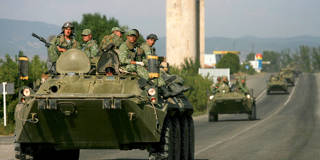At first glance, the Georgian war ten years ago this month and the global financial crisis that erupted the following month seem unrelated. But this is to neglect the deeper currents driving the confrontation in the Caucasus.
NEW YORK – Ten years ago this week, Russian tanks halted a few hours’ march short of Tbilisi, the capital of Georgia. That short war in the Caucasus brought down the curtain on nearly two decades of post-Cold War Western hegemony in Europe. Encouraged by US President George W. Bush’s administration, Georgia had initiated NATO membership talks, impelling Russian President Vladimir Putin to defend the red line he had drawn the previous year. Russia, Putin announced at the Munich Security Conference in February 2007, would regard any further eastward expansion of Western institutions as an act of aggression.

NEW YORK – Ten years ago this week, Russian tanks halted a few hours’ march short of Tbilisi, the capital of Georgia. That short war in the Caucasus brought down the curtain on nearly two decades of post-Cold War Western hegemony in Europe. Encouraged by US President George W. Bush’s administration, Georgia had initiated NATO membership talks, impelling Russian President Vladimir Putin to defend the red line he had drawn the previous year. Russia, Putin announced at the Munich Security Conference in February 2007, would regard any further eastward expansion of Western institutions as an act of aggression.